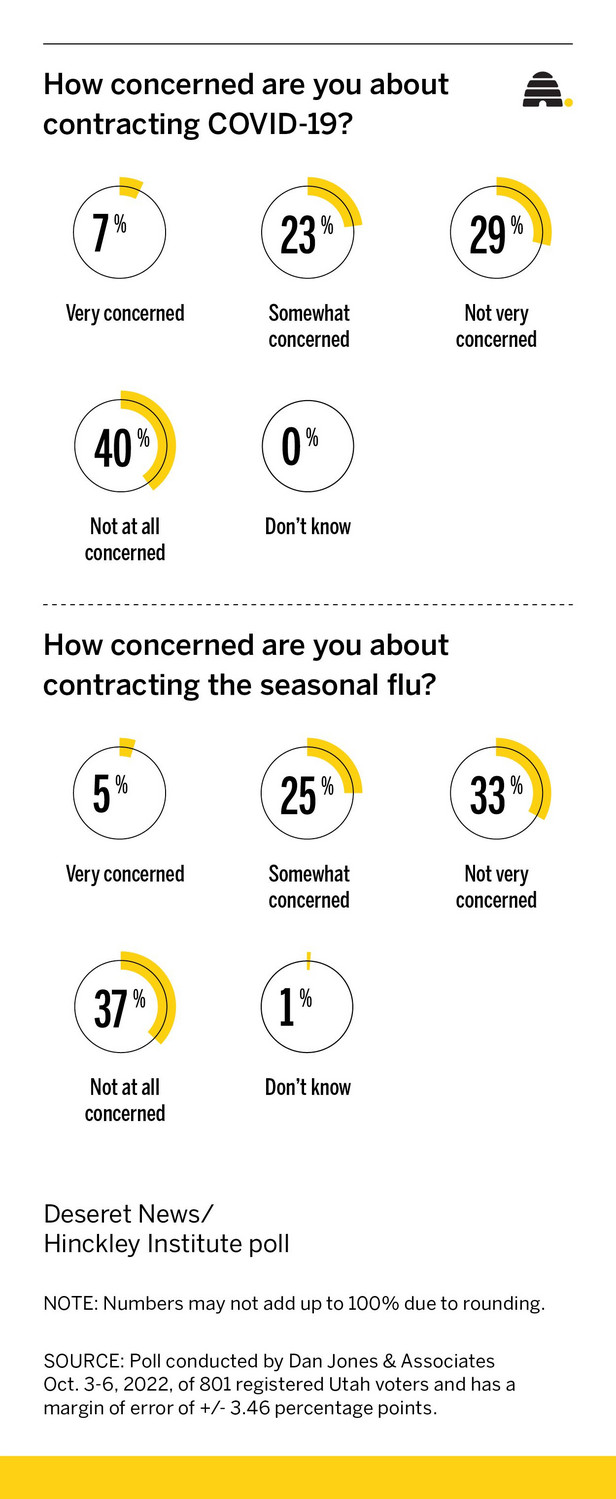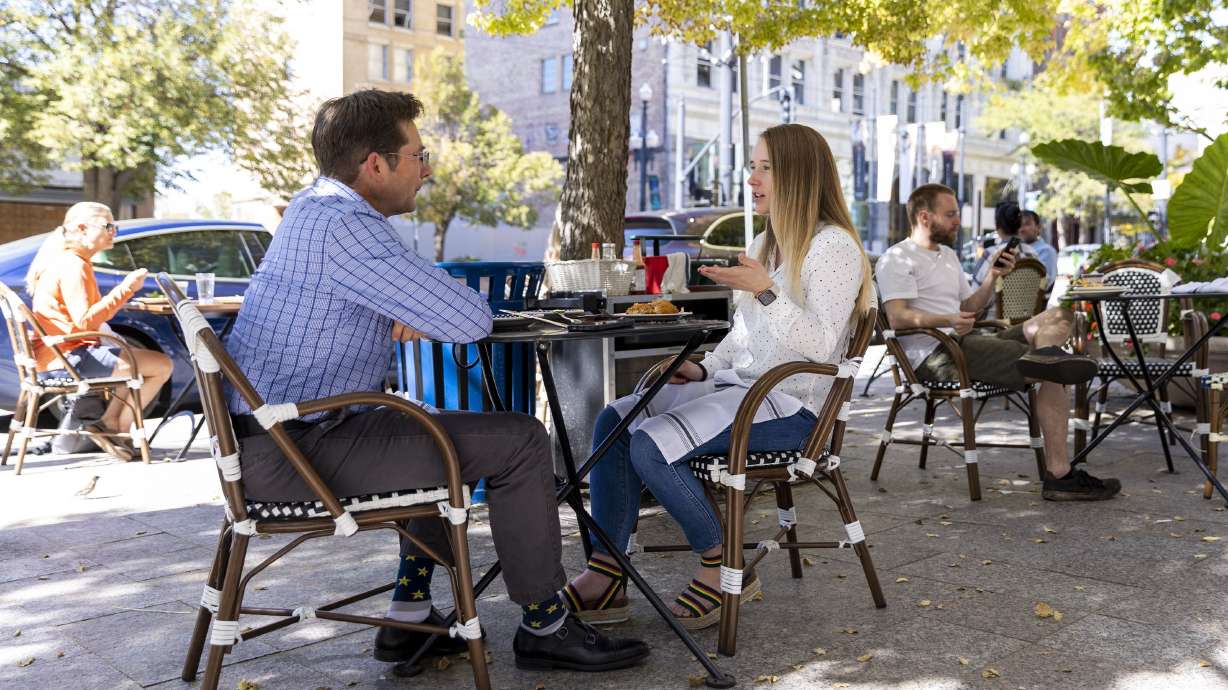Estimated read time: 6-7 minutes
This archived news story is available only for your personal, non-commercial use. Information in the story may be outdated or superseded by additional information. Reading or replaying the story in its archived form does not constitute a republication of the story.
SALT LAKE CITY — Just 30% of Utahns are worried about getting COVID-19 or the flu this fall, according to the latest Deseret News/Hinckley Institute of Politics poll.
The poll found the same level of concern about contracting either the coronavirus that sparked a pandemic or the seasonal flu, even though one virus is considerably more deadly. More than 5,000 Utahns have died from COVID-19 since the pandemic began in early 2020, while Utah reported 300 flu deaths in 2019.
Yet only 7% of Utahns are very concerned about coming down with COVID-19 and 5% feel the same way about the flu. Among the 70% of Utahns who aren't worried about either virus, 40% said they were not at all concerned about getting COVID-19, compared to 37% who said the same about the flu.
The poll was conducted Oct. 3-6 of 801 registered voters in Utah by Dan Jones & Associates for the Deseret News and the University of Utah's Hinckley Institute of Politics and has a margin of error of plus or minus 3.46 percentage points.
Throughout the pandemic, flu cases fell dramatically around the world as people wore masks, social distanced and avoided gatherings to slow the spread of COVID-19. But with many no longer taking those precautions, the flu roared back this year in the winter that just ended in Australia and other parts of the Southern Hemisphere.

That's led to new warnings that the United States and other countries in the Northern Hemisphere could be in for what Han Kim, a professor of public health at Westminster College in Salt Lake City, called a "double whammy" of flu and COVID-19 this winter.
"We are primed to see that," Kim said. "So a lot of us are concerned. But I can also see why folks are just ready to move on. There's plenty of other bad news out there, too. ... With the war in Ukraine, inflation, the economic bad news coming out, all of the political rhetoric, I think people are just trying to find some peace in their lives."
Hinckley Institute of Politics Director Jason Perry said Utahns don't feel the same way anymore about COVID-19.
"In the minds of an overwhelming majority of Utahns, COVID has joined the ranks of other viruses like the flu that are here to stay but no longer of serious concern because of experience, natural immunity and vaccinations," Perry said.
"Like other endemic diseases, prevention and treatment options are readily available for those who desire them or have serious health risks," he said. "Those remedies have significantly reduced the level of concern Utahns have about getting either of these viruses."

It can be easy to put aside any worries about viruses that aren't going away when it's been a while since they've done a lot of damage. Kim said people seem to have forgotten the flu is a killer, and are treating COVID-19 "like a cold almost" because the omicron subvariants currently circulating are seen as less severe than previous strains.
Yet even as COVID-19 cases decline, by mid-October, Utah's seven-day average count is more than 215 cases — a number that doesn't include at-home test results — along with six additional deaths in a week. Nationally, the daily average hit more than 38,000 new cases and 377 deaths, according to data compiled by The New York Times.
Mixed messages about the risks to public health, like President Joe Biden's recent declaration the pandemic is over, have no doubt hurt the administration's efforts to prepare people for a possible surge this winter through updated COVID-19 booster shots targeted at the currently circulating versions of the virus.

Only about 5% of eligible Americans have gotten the updated booster shots since they were first offered about six weeks ago to everyone 12 and older. The eligibility has since been expanded to children as young as 5 years old, and everyone 6 months and older is also encouraged to get a flu shot.
"We're not keeping up that vigilance," Kim said. "It seems like the message is getting lost."
Barbara Person of West Valley City, a retired district manager of the local office of a national inventory service, said she no longer worries about contracting COVID-19 and has always had so little fear about the flu that she's never gotten an annual flu shot.
To the 74-year-old, COVID-19 has become "like the flu. I'm not scared of getting the flu, either, or a cold, or anything. I'm not afraid of that." Person said she felt differently at the start of the pandemic, but started distrusting what experts were saying after getting the initial series of COVID-19 shots.
In the minds of an overwhelming majority of Utahns, COVID has joined the ranks of other viruses like the flu that are here to stay but no longer of serious concern because of experience, natural immunity and vaccinations.
–Jason Perry, Hinckley Institute of Politics
"I've not gotten any of the boosters and I won't," Person said, dismissing her heightened risk of becoming severely ill because of her age. "I'm very healthy and I'm not concerned about it at all. If I die, I die. I could die walking out in the street tomorrow or getting in my car and driving to the grocery store. I'm not going to live in fear."
Person said she'll wear a mask if required and has always taken health precautions like washing her hands frequently to stop the spread of disease. "If I know somebody has COVID, then I'm not going to go up and give them a hug and a kiss, believe me," she said.
It's been months since anyone around her has had COVID-19, Person said, but her granddaughter's father-in-law died from the virus a year ago, although "he was 50 and supposedly healthy." Still, she said she's not convinced COVID-19 "is as serious as they say it is even though I know people who have died from it."

Too many people take an all-or-nothing approach to COVID-19, Kim said.
"They take this binary approach, 'Am I safe or not?' We're really uncomfortable in these margins, these gray areas. The implication is, 'Oh, either I go out and enjoy my life ... or I sit at home and just isolate from everybody.' That's what people, I think, are thinking," the professor said.
The reality of living in a world where COVID-19 and other deadly viruses aren't going away is somewhere in between, he said.
"In fact, it's varying degrees of risk," Kim said. "Yes, you can still go out and live your life. Just be a little bit more careful."










